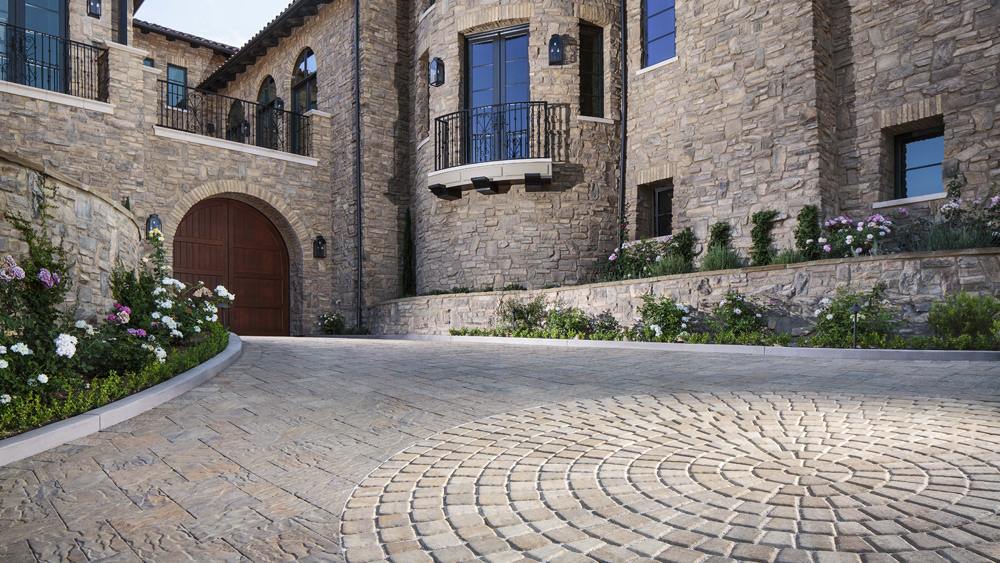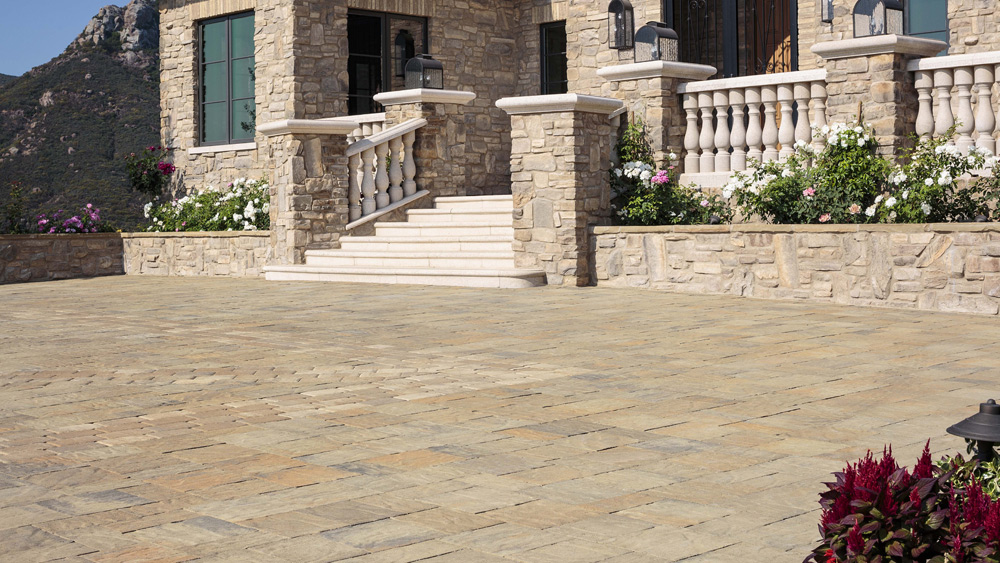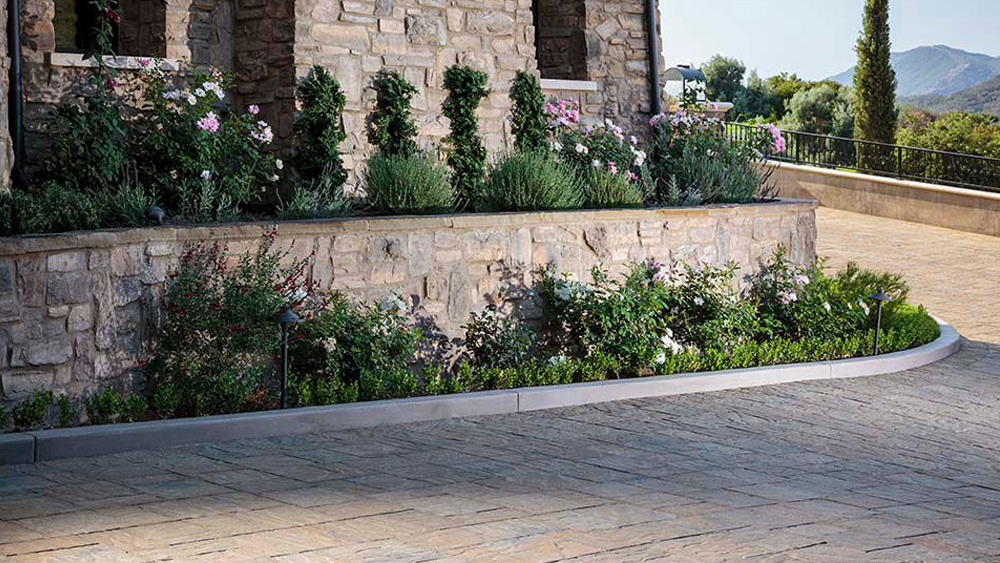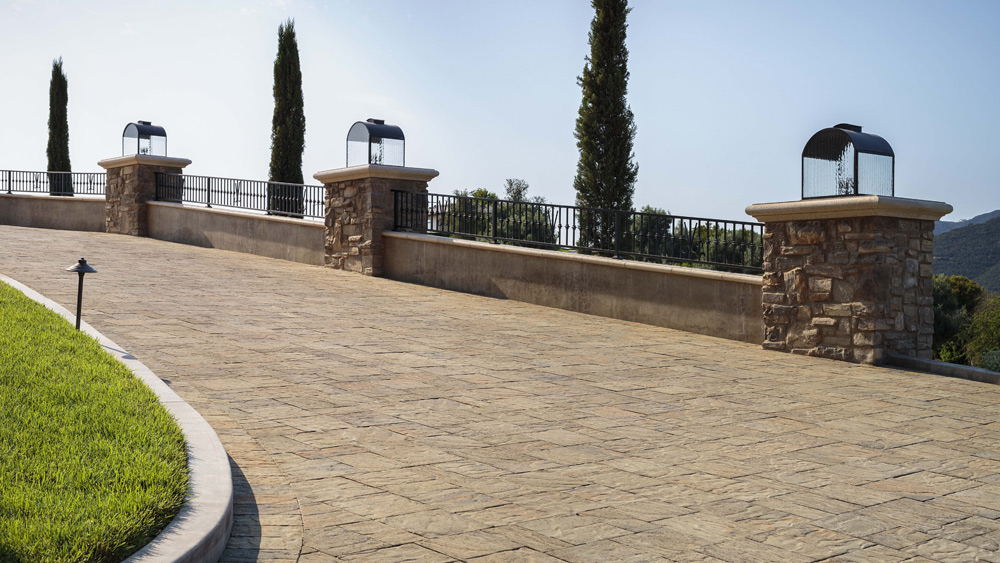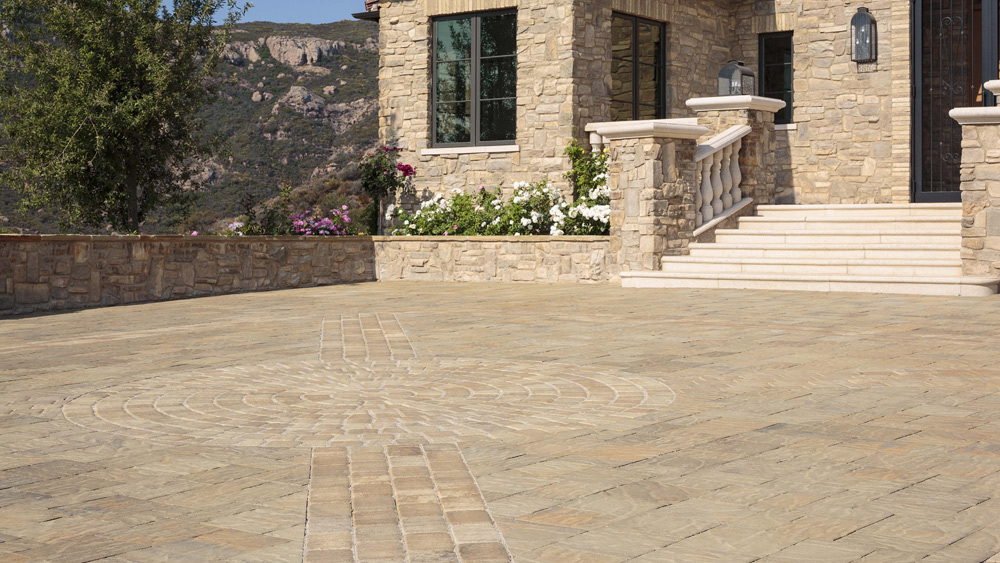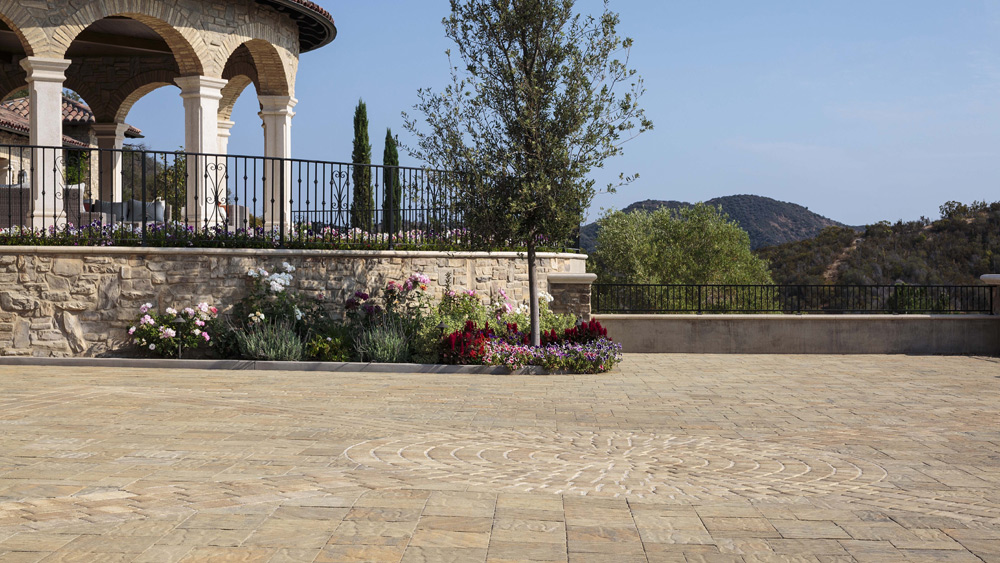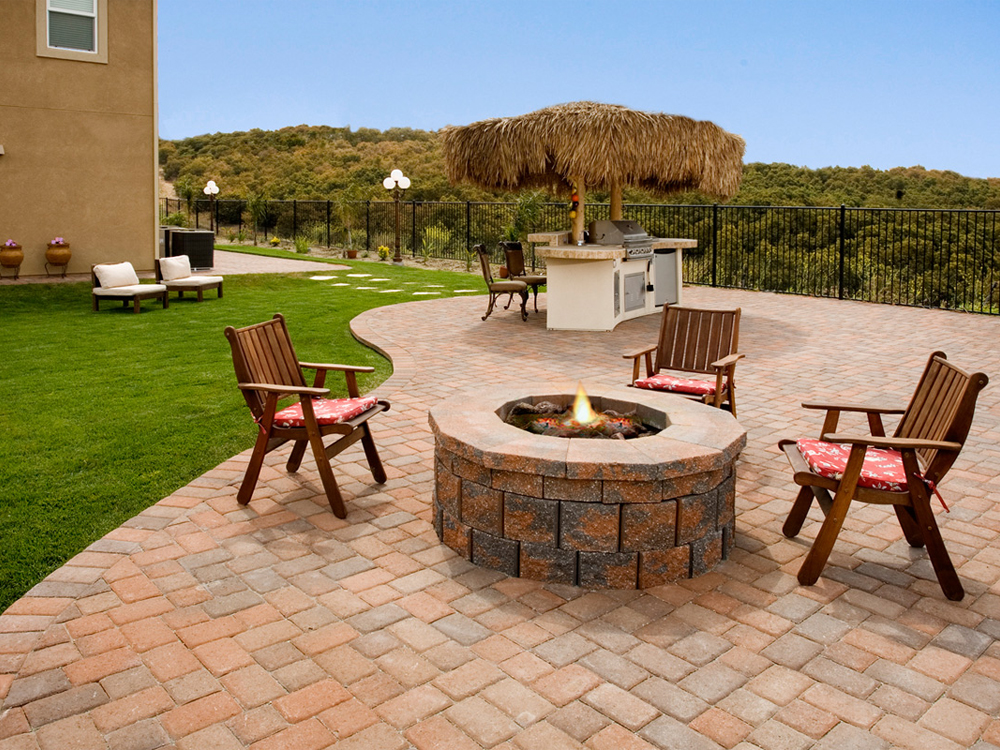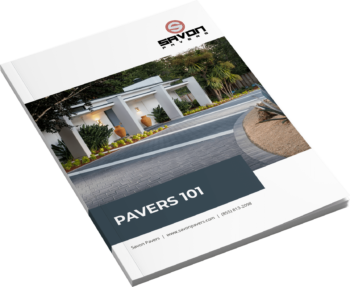Looking to spice up your driveway? Kick the concrete to the curb and replace it with driveway pavers! With so many options—concrete pavers, stone pavers, brick pavers, interlocking pavers and permeable pavers—it’s hard to beat the look and style of this driveway option. In the following guide to pavers, we will provide you with a detailed overview of this popular driveway material.
Materials and Options
The biggest benefit of a paver driveway is the wide scope of options you have with material, shape and color. Each type of paver has its own unique style and there are so many options that the hardest part is deciding which one works best for your project.
Materials:
Driveway pavers are made out of concrete, clay or natural stone. Each material comes with its own features, advantages and limitations.
Concrete Driveway Pavers: Concrete pavers are generally the least expensive paver option and come in a wide variety of options. Developments in manufacturing mean that you can purchase concrete pavers in pretty much any style you want, including those that even look like brick and stone pavers. However, when purchasing concrete pavers, carefully weigh price and quality as cheaper concrete pavers are more likely to chip over time.
Clay Driveway Pavers: Brick pavers are made from clay and come with their own unique charm. An aged brick driveway will retain its aesthetic appeal, while an old concrete paver driveway will just look…well, old. Unfortunately, though, brick pavers are more likely to crack compared to natural stone or concrete pavers, cost more than concrete and come in fewer color options.
Natural Stone Driveway Pavers: If you’re looking for both beauty and durability, natural stone is the way to go…but it comes at a price. The costs associated with quarrying, transportation and installation make granite, slate, limestone and bluestone the most expensive paver options. You can use natural stone paver veneers to cut costs. However, the veneers are usually very thin and not suitable for driveways. Therefore, it makes more sense to use them for patios.
Paver Options—Shapes & Sizes:
Once you’ve determined which material is most ideal for your driveway, it’s time to choose the shape and size best fits the look you’re after. Typically, there are two standard paver shapes that you will come across: square or rectangle; along with the one irregular shaped flagstone paver. Some manufacturers also offer irregular shaped pavers that create a circular or fan pattern when laid out. There are also two brick paver shapes: the standard brick and a modern brick with wavy edges.
You will also need to consider what size paver you would like to use. Manufacturers offer a wide range of square and rectangular sizes and there aren’t really standard sizes in terms of width and breadth. The most common thickness is 3 inches and it is important that you use pavers that are at least 2.36 inches thick so that they can handle the weight of domestic vehicles.
Paver Styles & Textures:
There are two overarching styles of pavers—ones that look brand new and ones that look aged. Within those two styles there are four substyles: bricks, cobblestones, flagstones and mixed.
Brick manufacturers may offer products with more textured finishes. However, modern brick pavers are usually crisp looking when installed brand new and weather beautifully.
Cobblestones were originally used to pave streets back when a horse and carriage was the main mode of transportation. As a result, they are typically used today to bring some old world charm to a project. Cobblestones, as well as flagstones, are made from natural stone or concrete.
The term “mixed pavers” refers to a mix of square and rectangular concrete pavers set in any pattern. Flagstones are rough edged pavers that resemble random shapes cut in a way that fits together, kind of like a jigsaw puzzle.
Natural stone pavers hold on to the texture of the stone they are made from. Natural stone cobblestones cut from quarried stone are either clean-cut with a smooth surface, making them look very neat, or they can also be made to look aged and weathered. Reclaimed cobblestones will already have that rougher, weathered look.
If you are using concrete pavers, you have any of the following looks to choose from: smooth, non-tumbled texture, tumbled texture (which makes the paver look weathered), embossed texture (the surface will have a dimpled effect), tumbled and embossed (a very aged look), slate texture, flagstone texture, and an old-world cobblestone texture.
Paver Designs & Patterns:
While you consider the style and texture of the paver you want, you will also need to take into account the design and pattern of your driveway layout. Using a combination of different shapes, sizes, styles, textures and colors will allow you to create an endless number of driveway designs. Common driveway paver layouts include the runner pattern, the herringbone pattern, the ashlar pattern and the basket weave pattern. Another option is to use different pavers to create a border for your driveway or to divide it into different sections. Pavers are usually set into a sand or gravel base, so you can also use the material you choose to fill the gaps between the pavers to enhance the overall design or pattern.
Paver Colors:
Due to the limited range of stones suitable for taking the weight of a vehicle, natural stone paver driveways tend to come in a short list of colors: mainly gray and brown tones. But once again, concrete pavers offer the widest range of options…from a variety of beiges, to deep reds and blue-gray tones. Brick pavers also come in a wide range of colors, from yellows and tans to reds, browns, blue-brown mixes and even gray-toned brick. Some manufactures offer selections with mixed color tones. This gives the pavers an attractive mottled look when laid.
Pros and Cons of Driveway Pavers
Pavers are the most popular choice for driveways, probably because the positives outweigh the negatives.
Advantages:
Variety—Pavers come in a large variety of shapes, patterns, colors and materials, allowing you to match the style of your driveway to the style of your home.
Possibility of DIY—Although we don’t recommend it, installing your own paver driveway is easier than installing concrete or asphalt.
Good to Go—Concrete and asphalt driveways require time to cure before they are ready to use. However, if you have a paver driveway, you can use it right away.
Durability—Paver driveways typically last 20 to 25 years, require very little maintenance, and are not prone to cracking, unlike concrete or asphalt.
Drainage—Permeable or porous pavers, or pavers with joints between them, allow for water drainage. Concrete and asphalt driveways require the installation of drains.
Skid Resistant—Pavers feature a tougher, ice-free surface compared to a flat, slick concrete surface.
Warranty—Due to the durability of driveway pavers, it is common for materials and installations to come with lifetime warranties.
Easy Repair—If you do need to ever repair part of your driveway, it is much cheaper and easier to replace a few pavers compared to replacing a section of concrete or asphalt.
Cost—Although a paver driveway requires the largest investment upfront, it has the longest lifespan and requires little maintenance. Therefore, in the long-term, pavers are the wisest investment.
Disadvantages:
Cost—Installing a paver driveway is expensive. Installation is labor-intensive and material costs can be very high.
Shifting/Setting—Movement in the ground could create problems if your pavers are not installed correctly. However, correct preparation of the driveway base should prevent this problem from occurring.
Cleaning—Because pavers do not create a completely flat surface, they can be harder to clear in areas with a lot of snow or debris.
Pavers vs. Concrete
Appearance: Although there are a several ways to make poured concrete visually appealing, pavers add more character and charm to the exterior of your home.
Cost: In terms of material cost, concrete paver vs. poured concrete is about the same. However, because laying pavers is more labor intensive, installation costs will be significantly more than poured concrete. Brick and natural stone pavers will be more expensive than poured concrete and concrete pavers.
Durability: If you’re looking for a durable material with low maintenance costs, then a paver driveway is the right choice for you. Poured concrete is more likely to crack, especially in areas with extreme temperatures and shifting soil. However, quality installation of concrete, like quality installation of pavers, can significantly reduce the likelihood of cracking.
Repair: It is much easier to repair a paver driveway. The repaired area will be less noticeable compared to a poured concrete driveway.
Professional Installation
The following is a basic description of a paver driveway installation to aid you in the process of gathering estimates and discussing the project with contractors:
- We will excavate up to 10 inches of native soil to form the driveway bed.
- A blend of aggregates, including a 1- to 2-inch thick top layer of sand, is installed in the bed and each layer is compacted. If you are covering an existing gravel driveway or an aggregate base beneath a removed concrete or asphalt driveway, only a layer of sand may be required before pavers are installed.
- We install and anchor edge restraints. These will keep the pavers from spreading out when driven on.
- We will install your pavers by hand in the chosen design.
- Workers use a plate compactor to tamp pavers firmly into place.
- Sand or a similar filler material is poured onto the paver field and pushed over the surface so that it settled into the joints.
- Pavers are sealed either before or after sand is added to protect their surfaces and to bind the filler material to keep it in place. This step is optional but highly recommended.
Maintenance & Repair
As we mentioned before, paver driveways require very little maintenance. You may sweep and/or hose down your driveway to remove any weeds or grass that appear between pavers. Movement in the land or tree roots may cause problems over time, however, it is relatively easy to fix the affected areas.
Cost
The average cost of buying and installing driveway pavers is $10-$20 per square foot. In order to get an accurate quote, however, you must first determine the type of paver you would like to use.
Call us today at (855) 749-8739 for a free estimate and design for your project.

